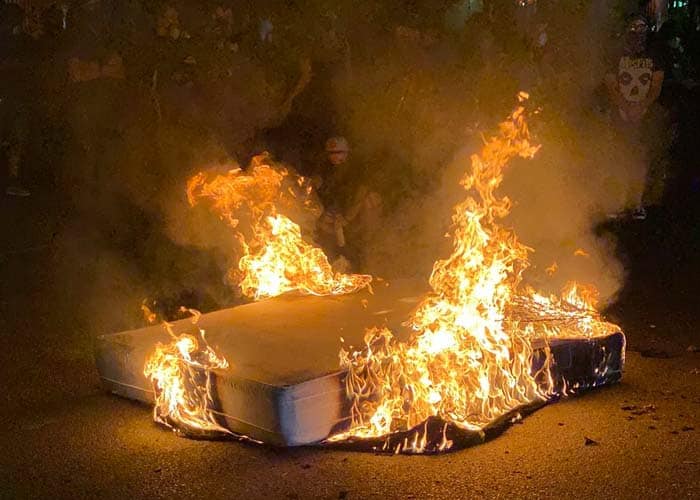Yes, mattresses can catch fire, but it’s not as bad as you think. It makes sense, after all – if you were to look up “flammable furniture” on Google, you would find countless images of people sleeping on what seems like a big pile of kindling. But is this true? Is it safe for someone to sleep on a mattress that could catch fire at any moment? According to experts, there’s no need to worry about your mattress being flammable!
The UK has high standards and tests to make sure your mattress doesn’t catch on fire. However, most mattresses sold in the UK are made with synthetic materials that release toxic gases into the air. A mattress fire’s size is determined by how much oxygen is available to feed it, as well as fuel loads (how big the fire is).
There is not much fuel available to feed a fire in most homes, so it burns itself out fairly quickly. In an oxygen-poor environment (like the inside of your mattress), fires smoulder and burn slowly – sometimes for hours or even days after they’ve been ignited.
How can I tell if a mattress is flammable?
There’s only one way – read the label! If your mattress was manufactured overseas, it might not comply with British Standards, and therefore could be extremely dangerous in the event of a fire.
Also, as you can imagine old mattress aren’t up-to todays standards so they will ignite quicker and get hotter than a mattress in a box.
Are mattresses tested?
Yes – all foam and spring-based mattresses sold in the UK must pass a stringent flammability test set by the British Standard (BS) 1852: Part 20 for domestic use and BS 5852: Part 14 for contract use. The tests include exposure of the mattress to temperatures of up to 750°C for 30 minutes and require that the foam used in a mattress fully char before it ignites.
What if my mattress is not UK-made?
If your mattress was manufactured overseas, you should be highly cautious of its quality. There is no regulatory body outside of the UK that conducts this type of testing or sets standards, so you have no way to know what type of materials or flame retardants are being used.
Does memory foam burn?
Memory foam is made up of polyurethane. When exposed to heat, the fire retardant used in memory foam breaks down and releases hydrogen cyanide gas (HCN). HCN is highly poisonous. This means that when your mattress catches fire, it can produce toxic gases for hours after you think it has gone out.
Are memory foam mattresses safe?
Yes – provided they have been manufactured according to British Standard (BS) 1852: Part 20 or BS 5852: Part 14 standards. All UK-manufactured memory foam mattresses must pass the same stringent flammability tests as spring and foam-based mattresses.
Do all mattresses catch fire?
Flammability tests are conducted on mattresses to ensure that the chance of them catching alight is as small as possible. The flame retardant used in all UK-manufactured foam and spring mattresses will delay ignition, reduce the rate at which a mattress catches fire, prevent it from emitting toxic gases after being ignited and allow the fire to be put out before it spreads.
Will my mattress catch alight?
The main cause of home fires is naked flames, such as candles and lighters – not electrical appliances or faulty wiring (although these can be dangerous if placed too close to your bed). Of all home fires in the UK, only 0.04% are caused by faulty mattresses, so it is doubtful that any mattress will catch alight.
What should I do to prevent my mattress from catching fire?
Don’t smoke in bed and ensure your matches/lighters are placed well out of reach; never leave burning candles unattended; place TVs, computers and other electrical appliances away from the bed; make sure you have working smoke alarms fitted in your home, and consider an alarm that detects smouldering fires.
Do I need to buy a fireproof mattress?
No – it’s not necessary to protect yourself with expensive, heavy-duty covers or sleep on mattresses made of unique materials (unless you are particularly worried about the safety of your bed). Quality mattresses manufactured in the UK to British Standards will provide you with all the protection you need.
Are there any other ways I can protect my home from fire?
Several products are available, such as non-flammable mattress protectors, which have been proven to prevent fires from starting or spreading. By removing items that start fires, like lighters and heaters, you can reduce the risk of fire damage by up to 95%.
Is there anything else I should consider?
Do not place any flammable materials or combustible liquids next to your mattress – they could catch alight and cause serious harm.
In conclusion, if you are concerned about the safety of your home from fire, you should ensure that your home is fitted with smoke alarms and a sprinkler system. In the UK, it has been shown time and again that quality mattresses manufactured to standards such as BS 1852: Part 20 or BS 5852: Part 14 are extremely unlikely to catch alight – but if they do, their flame retardant will ensure that they do not spread the fire.

 Nectar Mattress
Nectar Mattress 


